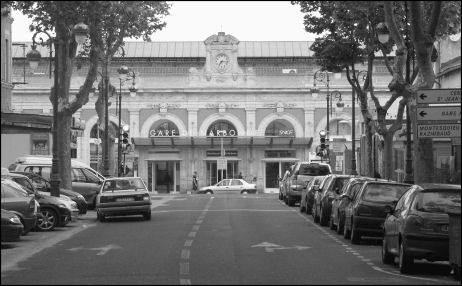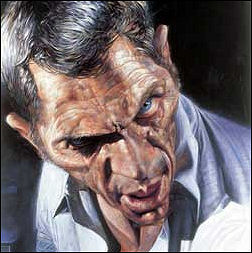Jacques Audiard‘s A Prophet, my most lamented miss of the Cannes Film Festival (due to oversleeping), has been acquired for U.S., Latin American and Australian distribution by Sony Pictures Classics. Variety’s Sharon Swart reported early this morning that “multiple distribs had been interested in the film but several reported that sales company Celluloid Dreams had attached a steep price tag for the U.S. rights.” Audiard made it in my book with The Beat That My Heart Skipped, an ’05 remake of James Toback’s Fingers.
Month: May 2009
Malick’s Tree in ’09?
In a story about a Spanish distrib buy of Terrence Malick‘s Tree of Life, Screen Daily‘s Chris Evans reported yesterday that “the film is due for release in the U.S. later this year.” No quotes support this alleged intention so it’s probably best to hold off until a solid confirm comes in. The story describes Malick’s film as being about “a man who struggles to come to terms with a childhood torn apart by sickness, suffering and death.” What about the dinosaurs? (Thanks to The Playlist for the shout-out.)
Let ‘Em Out
A few things were bugging me during the Cannes Film Festival but I didn’t want to vent for fear of muddying the waters (as well as not wanting to sound overly pissy). But now that I’m out of it and wandering around Spain I’m figuring what the hell. I was irritated on an almost daily basis by the following:
(a) People doing the “mall meander” along the Croisette. That’s a Fran Leibowitz term that refers to New York tourists walking much too slowly and forcing purposeful striders like myself to walk around them. These people walk along like they’re they’re half-asleep in their bathrobes at 3 am, shuffling into the kitchen to get a glass of milk.
(b) People who don’t sit as much as collapse-flop into seats directly in front of you, like four-year-olds falling backwards onto a bed of pillows, and in so doing banging your kneecaps. A good portion of these same people also tend to rock in their seat like 185-pound hyper poodles. (“This is fun…like a rocking chair!”) They seem unable to just sit in their seat like a statue or a bean bag or someone like myself might. Then again Wednesday night at the Michael Haneke/ White Ribbon screening my knee pushed slightly against the seat of a guy in front of me, and he gave me a dirty look. Fuck him too.
(c) Older men who wear shorts and sandals. I don’t want to even glance at their white legs and funny-looking digits. Show some self-respect and wear long pants and loafers, for Chrissake.
(d) Older short guys who huff and puff as they take take three or four minutes to place their small suitcases in the overhead rack on a train. (Okay, this isn’t a Cannes peeve — it’s a train-from-Narbonne-to-Barcelona one.)
Extreme Prejudice
I’m totally out the loop on McG’s Terminator Salvation, and not feeling all that badly for that. It’s obviously been taking critical hits — a 33% Rotten Tomatoes positive from the regulars and 32% positive from the elites. Some HE regulars must have contributed to that $3 million Thursday haul. The forum is open.

Parnassus Phffft
If someone had asked me to write an imaginary-exercise review of Terry Gilliam‘s The Imaginariam of Dr. Parnassus, which was obviously thrown into serious jeopardy 16 months ago by the death of its star, Heath Ledger, I might have started with a lead that reads something like this, having heard what I’ve heard and presuming the worst:

“Marred by shoddy special effects and half-formed fantastical conceits, Gilliam’s film has the feeling of a comic fantasia desperately seeking to find its rhythm. Nearly abandoned after the sudden death of leading man Heath Ledger prior to completing production in January of last year, the final result reflects the frantic cobbling together of missing pieces.”
This, in fact, is what Indiewire‘s Eric Kohn has posted from Cannes about two hours ago.
“Ledger’s posthumous status haunts his scenes, as it does in the moments in which various actors replace him. Compounding that problem, the cartoonish CGI and inconsistent storytelling yield a seriously disjointed experience. Still, Parnassus deserves to be seen, probed and evaluated as an interesting misfire in Gilliam’s delectably quizzical canon.”
Which begs the question, when was Gilliam’s last straight-shooting, no-excuses, on-target film? The Brothers Grimm? The Fisher King? Time Bandits? My most positive Gilliam association, frankly, isn’t one of his films but Lost in La Mancha, that doc about the collapse of his Don Quixote film.
On The Fly

Pretty much all the French-language women’s fashion mags have been radically reduced in size. There’s no way to get a sense of scale from this photo, of course, but they’re a little bit bigger than the old TV Guide from way back when, or the old Reader’s Digest, which half-mattered as a publication about eight or ten years ago.
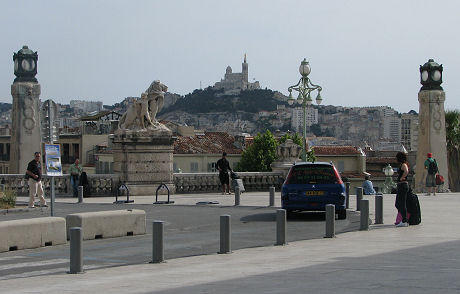
Looking southeast from the Gare de Marseilles — Thursday, 5.21.09.
One Mistake
I arrived yesterday morning at the Cannes train station well ahead of my 10:29 am train to Montpellier, which would arrive three and a half or four hours hence. An hour or so later my Barcelona train would depart and put me on the streets of Woody Allen‘s favorite Spanish city by mid-evening. All worked out, standing on the right voiture, everything in order — what could go wrong?
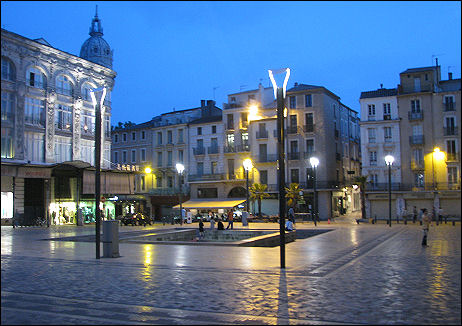
Place Hotel de Ville in Narbonne, France — Thursday, 5.21, 9:15 pm.
At 10:23 am a westbound double-decker train pulled up and stopped. People got off and on. My French being in the same pathetic state it’s been for several years, I didn’t comprehend the announcement that informed French-speaking travelers where this train was headed. I only knew that in the States it’s normal for a train departing at 10:29 am to pull up a few minutes earlier to allow people plenty of time to get off and get on, etc. So I got on.
Excerpt the train left at 10:25 am, and trains never leave before their scheduled departure time. An awful stomach-acid feeling kicked in. But I’ll be okay, I told myself. As long as the train stays on a westerly course and hugs the coast and stops in Marseilles, I could just get off in Marseilles and jump on the correct train – i.e., the one that I presumed was about four minutes behind. Five minutes later I pulled out the iPhone, checked the GPS map and realized that my train was heading north by northwest, towards Grasse and other municipal metaphors for hell.
That was it, dead meat. No Marseilles or Montpellier on this route, and with all the backtracking I’d have to do I’d almost surely miss the 4:17 pm Montpellier-to-Barcelona train, which was the last train from Boot Hill that day. Unless…
I got off at the next stop and called a cab. My wild-eyed plan, I told the driver, was to catch the train I’d missed, possibly in Marseilles. But that idea died a pauper’s death when he told me it would cost 350 to 400 euros to drive to Marseilles. So I asked to be taken to le Gare de Nice, which cost me 70 effin’ euros. I went up to the SNF ticket window and was told that for the sin of missing my train my Cannes-to-Montpellier ticket had been devalued by 50%. So I bought a new ticket to Narbonne, about an hour north of the Spanish border and a little bit closer than Montpellier. My new tickets, penalties included cost me about 75 euros.
So stepping on the wrong train in Cannes – one mistake! — cost me about 160 euros and change, or over $200 U.S.
Reckoning
“It can fairly be said that the chain of catastrophic bets made over the last decade by a few hundred bankers may well turn out to be the greatest nonviolent crime against humanity in history,” writes Vanity Fair editor Graydon Carter in the current issue. “They’ve brought the world’s economy to its knees, lost tens of millions of people their jobs and their homes, and they could drive an estimated 200 million people worldwide into dire poverty. In other words, never before has so few done so much to so many.”
And it’s all manifested within the last six or seven month. It’s huge, staggering. But where is the rage? Everyone I know just gets grim-faced when the subject comes up and says, “This is bad, I’m worried” and so on. What this crisis needs is a cathartic documentary that will lay it all out in man-on-the-street terms and hoist those bastard bankers on tall iron spears. Which is why I’m very excited about Michael Moore‘s forthcoming documentary about this. It’s obviously made to order for the guy, who — give credit where due — is a brilliant muckraker when so inspired.
Variety announced today that Moore’s untitled doc will open on 10.2.09. Which means, of course, he’l be taking it to the Toronto Film Festival. Overture Films and Paramount Vantage are the film’s co-financers and distributors.
Nirvana
For the last nine-plus days I’ve been using the Orange wifi cafe for getting online, but with hundreds of journalists and photographers using it at the same time it’s never been great. I had to save again and again to make fresh posts or edits register for good. And then this morning I dropped into this little place around the corner from the train station, plugged their ethernet cable into the laptop and …my God, bliss! Beautiful speed and gorgeousity! Nothing makes me happier. If I’d had this kind of access from the start…if only!
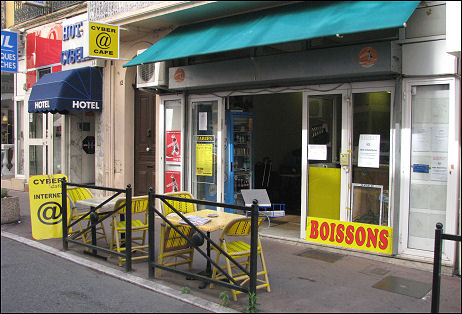
Last Non-Embrace
My final invitational Cannes activity was trying to attend the Inglourious Basterds party, which began under beach tents opposite the former Noga Hilton (now called the Palais Stephanie) around 10 pm last night. A dense pack of tuxedoed, dressed-to-the-nines types who’d just come from the Basterds screening at the Grand Lumiere were packed around the entrance. It looked like a mound of termites except for the size of the termites and the quality of their apparel and coifs.

Except there was no entrance — the security goons had every everything thoroughly blocked off — and even people with hard tickets were looking anxious and desperate. I scrunched and winnowed my way through three separate lines, each time being told to go to the other line. At least one Weinstein Co. publicist (i.e., Emily Feingold) stood in the entrance area but told me she couldn’t do anything to help. Indiewire‘s Eugene Hernandez was standing and surging alongside; Variety‘s Sharon Swart and Michael Fleming joined the throng at a later point. “Emily Feingold…your friends are suffering!”
When it comes to ritualized humiliations I’m at a slight disadvantage because I have a threshold of dignity — a line I will not cross. I hit it after a good 20 minutes of trying to get in when word came down for the fourth time to try another approach and that “anyone without a hard ticket will have to wait.” This despite several of us having been told to come with the assurance that our names would be at the door. That was it. I walked down the Croisette a free man — liberated, breathing clean air, Papillon reborn.
McQueen Downgrade
In his latest thelmagazine video essay, Matt Zoller Seitz explains that while Steve McQueen will always be Steve McQueen, “calling him a great actor, or even a great leading man, is a bit of a stretch.” The piece is linked to the McQueen tribute that begins today through the Film Society of Lincoln Center.
“Steve McQueen is the gold standard for movie tough guys,” he begins. “Stoic, street-smart, unfussy, supercompetent and absolutely, positively not to be fucked with; the consummate man of action. He’s the guy every guy secretly wants to be — unassuming but deadly, and always in charge. McQueen’s grace isn’t the deliberate, predmeditated grace of a ballet dancer, but of a footballer spotting an opening and slipping through it for a goal.
“He’s one of the most sheerly pleasurable physical actors in movie history. Even in repose or when performing mundane tasks, he seems charged with energy. The camera loves him, and directors acknowledge this by serving up seemingly obligatory scenes of McQueen donning and divesting himself of his character’s uniform (the bulletproof vest in The Getaway, the shoulder holster in Bullitt), giving viewers a chance to admire his lanky physique and a demeanor that would seem insufferably smug if he weren’t a working class guy playing working class guys — a peasant prince who earned his royal title.
“McQueen doesn’t join the club, he just visits, always keeping one eye on the exit.
But after thinking things through, Seitz’s McQueen infatuation “got downgraded to affection and respect,” he says. “A masculine code that insists on always being right and in control, and that withholds affection from women for the sake of seeming cool, is neither real nor useful, and ultimately ruinous to viewers who uncritically embrace it. It seems altogether fitting that McQueen spent a fair part of his screen career behind bars. Over the years, he built himself a lucrative and comfortable onscreen prison, and unlike his characters, he lacked the skills, or the will, to break out.”

